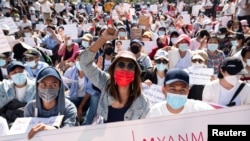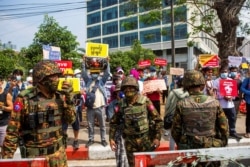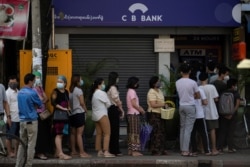Myanmar’s banking sector continues to be in chaos as mass anti-coup demonstrations saw armored vehicles patrol the streets in the city of Yangon this past week.
Since the military takeover at the beginning of February, professionals from a variety of sectors, led by medical workers and including bankers, have joined the Civil Disobedience Movement (CDM) – a strike campaign to resist the military government. Followers have insisted they will not return to work until the elected government has been given back its power.
“I don’t want to live under [a] military government. So, I joined CDM and fight for democracy,” one employee of Myanmar Apex Bank (MAB) told VOA.
Many banks nationwide remain closed, while others have scaled back their operations.
Residents must deal with long lines at ATMs, while cash withdrawal has been either reduced or unavailable, and businesses are facing cash flow difficulties.
One employee from Ayeyarwady Bank (AYA) told VOA that although the strikes have made life difficult for ordinary people and businesses, they have made it more difficult for the military government.
“Myanmar’s current banking system is relying on private banks. We have to rely on private banks for the country’s cash flow and our interactions with international banks. I think the strike by the private bank employees themselves will make it difficult for the junta to manage money,” the banker said.
Myanmar is one of the poorest nations in Southeast Asia, and despite the additional financial strain, the bankers said they personally aren’t being pressured to return to work, and they haven’t received any personal visits from the military, yet.
“Until now, from the military, no visits yet,” another AYA banker said. But the banker admitted he knows of “soldiers in civilian clothes” visiting banks and asking for contact details of the managers.
Myanmar, also known as Burma, was ruled by armed forces from 1962 until 2011. In 2015, leader Aung San Suu Kyi and her National League of Democracy (NLD) party won the country’s first open democratic election.
General elections in Myanmar in November 2020, saw the military-backed opposition lose heavily to the NLD, leading it to claim there was widespread electoral fraud.
Myanmar’s military, known as Tatmadaw, removed the NLD government on Feb. 1. Military commander-in-chief Min Aung Hlaing took power, announcing a “one-year-long state of emergency” and saying a future general election would be held. NLD party members were detained while Suu Kyi and President U Win Myint were arrested.
Since then, widespread protests have taken place across Myanmar, with thousands demanding an end to the coup. More than 400 people have been arrested, and at least two people have died, including a protester and a police officer, local reports say.
The new deputy governor of the Central Bank of Myanmar has slammed the CDM movement, claiming protesters are “destroying their own economy.”
Win Thaw is the military-backed replacement for former deputy governor Bo Bo Nge, who has reportedly been detained with his whereabouts unknown.
Win Thaw told Frontier Myanmar, an English-language news outlet in Myanmar, that long-term boycotts by employees would have a negative impact on the economy.
“The banking system is needed to develop the country’s economy. Bank staff shouldn’t refuse to come to work,” Win Thaw told Frontier. The deputy governor later added that the Central Bank of Myanmar has “plans A, B and C to ensure the financial system does not come to a halt,” but refused to elaborate on what those plans were.
Zeya Thu, a Myanmar political and economic commentator, warns that Myanmar’s political crisis will lead to financial instability and that eventually “banks have to resume their services.”
“The fact that banks are closed makes people feel financially insecure. Many of them are financially insecure and they are thinking they will lose their savings forever. Companies won’t be able to provide monthly salaries,” Thu told VOA.
Aung Wai Yan, treasurer and senior officer at Shinhan Bank, says the protests have had a “prompt impact” on the whole country, as banks are afraid to dispense cash, convenience stores have denied card payments and payments for international trade and currency are nearly at a standstill.
“Next week is interesting, [it is] pay day weeks for most organizations. [The] banking sector service is critical. The foreign exchange market has almost stopped. International trade payments [have] delays. Border trade has stopped. Tax payment and logistics payment has stopped. All import and export payments have stopped. Now Myanmar’s financial sector is so risky,” he told VOA.
According to U.S. citizen Adam Hunt, a director of ONOW, a fintech social enterprise based in Myanmar, the nation has been badly affected by the COVID-19 pandemic, causing an increase in digital financial services to facilitate relief and social welfare payments.
But since the coup, Hunt said his company is one of many facing an uncertain future under the military government and added that the CDM movement has increased uncertainty in all sectors.
“Even as companies of all sizes are finding ways to support their employees' right to protest, CDM participation is causing substantial uncertainty in all sectors. Companies are making operational, or furiously developing, business continuity plans that call for cash reserves. When bank operating hours are unpredictable, and when mobile money services are threatened due to frequent internet cuts, it necessitates withdrawal of capital for both households and businesses to have physical notes on hand,” he told VOA.












